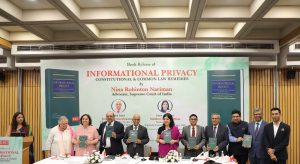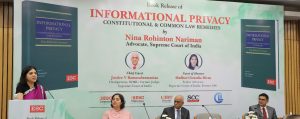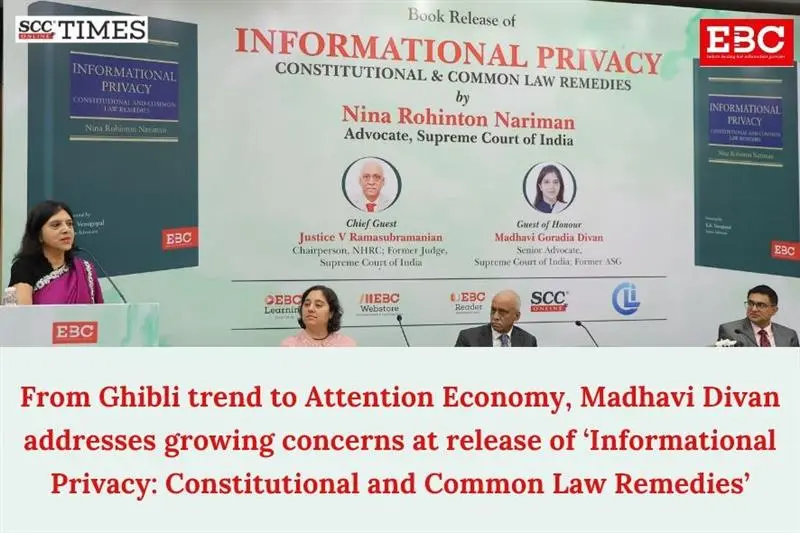Ms. Madhavi Goradia Divan, Senior Advocate, Supreme Court of India, graced the book release of ‘Informational Privacy: Constitutional and Common Law Remedies’ as the Guest of Honour. Authored by Ms. Nina Rohinton Nariman and published by EBC, the book delves into the evolving jurisprudence of privacy.

Addressing the distinguished gathering, Ms. Divan highlighted the significance of informational privacy in the digital age and the role of constitutional and common law principles in safeguarding individual rights. She commended the author’s in-depth analysis and underscored the book’s relevance for legal practitioners, scholars, and policymakers navigating the complex intersection of privacy, law, and technology.
Opening her address, she stated that-
“Book writing and particularly law book writing is very hard work. A law book always stays with you and is a work in progress.”
She appreciated the author, Ms. Nina, for choosing the subject ‘privacy’, which is an exciting, cutting-edge subject. She commented that she could foresee sequels in the making, as privacy is a swiftly moving subject.
Privacy and Constitutional values
Talking about privacy, she stated that “it pervades our daily existence today”.
“It is on our ability to protect informational privacy that hinges the enjoyment of other fundamental rights and values under the constitution, whether it is human dignity, liberty of thought, freedom of conscience, freedom of movement, self-determination, free speech, and expression. Onslaught on informational privacy is taking away ‘freedom of thought’ which is something very innate to human beings.”
Underscoring the importance of privacy, she emphasised that in the age of data mining, humans are being robbed of their ability to think freely.

Ghibli Trend
Commenting on the Ghibli art trend, which allows users to transform their photographs into the signature aesthetic of legendary animator Hayao Miyazaki, she remarked that this sparks a debate on the impact this will have on real-world art. She stated that art is meant to be personal, imaginative, subjective, and innovative, but it is now being replaced by mass commodification and automation.
She raised an alarm about data privacy and security risks associated with this trend, as millions are uploading their photographs just for a kick and not for any utility or convenience. She averred that this normalisation of surrendering personal data, which can be seriously misused, is very problematic. She posited that these photographs can be misused for fake evidence, fake images, scams, defamatory content, targeted hate speech, revenge porn and sextortion.
“We have dulled into a sense of such unquestioning complacency, where we follow the herd and exercise less and less independent thought.”
In light of the increasing dependence on these platforms, Ms. Divan said that human beings are not even challenging themselves to make informed choices, but have become so accustomed to believing that these are free services and have numbed their minds to the actual cost, which is being paid in kind in terms of the barter of their privacy.
Attention Economy
She discussed ‘attention economy’, wherein, businesses, media platforms, and advertisers compete for people’s limited attention, as it directly translates into revenue through advertising, engagement, and data collection. She said that human attention itself has become a scarce commodity, so scarce a commodity that it becomes a valuable economic resource to be monetized. The big tech companies compete for user attention, using very sophisticated algorithms and data analytics to capture and retain attention and even to steer preferences in a particular direction.
Ms. Divan exclaimed that the irony is that our own data is used against us to mould our choices and to steer them through digital nudging in a different direction. This very business model of this economy is surveillance.
She stated that-
“We [Humans] are the products who are being offered to advertisers, who monetise this by selling it to Governments, all, of course, for themselves. This can used for anything, from moulding product choices to electoral choices.”
National Security and Privacy
Ms. Divan discussed the TikTok dispute in the USA, where the US Supreme Court upheld a ban on the grounds of national security.
She also illustrated that in Australia, a blanket ban on social media used by teenagers has been imposed, which is going to come into effect later in the year.
Highlighting how the world has been responding to privacy issues, she highlighted that schools in the USA have filed class action suits against the tech giants for a staggering amount in damages for the mental health crisis that they have caused to young people. It has been claimed that the platforms have been designed to be addictive, which is causing a mental health crisis,
“Given how pressing this issue is, it is an irony that it took us such a long and checkered battle to declare the right to privacy as a fundamental right”, she stated.
K.S. Puttaswamy (Privacy-9J.) v. Union of India, (2017) 10 SCC 1
Discussing Puttaswamy (supra), Ms. Divan highlighted that Justice Nariman discussed three facets of primacy, one relating to the physical persona of an individual (his name, likeness, physical attributes, voice), two, informational privacy; and the third being the autonomy of choice. In this context, she furthered that Ms. Nina’s book is about remedies, and she provides some interesting solutions. Regarding the constitutional remedies, Ms. Divan discussed that the book delves into the horizontal application of fundamental rights, as recognised in Kaushal Kishor v. State of U.P. (2023) 4 SCC 1. While congratulating Ms. Nina for her exemplary work, she reflected on the various remedies that the book offers.






